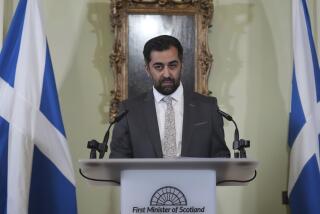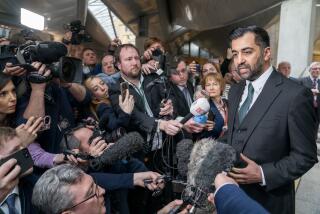Scottish Independence Flame Burns Anew : Nationalism: 286 years after forced British union, leaders of current movement tell desire for a peaceable divorce.
- Share via
BANNOCKBURN, Scotland — The kid in the fifth row wants to see some blood.
Robert, a plump, 9-year-old redhead in knee pants, and 274 others from four primary schools have come to the Bannockburn historical museum to see a movie about Robert the Bruce.
On this spot he freed Scotland in 1314 from England’s Edward II, also known--in an uncomplimentary way--as the Hammer of the Scots.
Young Robert especially wants to see how, at the beginning of the fight, his namesake split open an Englishman’s head with a battle-ax. It was an expression of anti-Englishness that most Scots today would find extreme--even those who want to see their nation independent once again.
“We’re trying to make it fun to learn history,” Jeannette Macaulay of the National Trust for Scotland said of the museum. “If you catch them on the young side, you know it’ll carry through. But we don’t go as far as talking about independence today.”
Nonetheless, independence is much on the minds of Scots. Two hundred and eighty-six years after Scotland was forced back into unity with England in the formative stages of the British Empire, a growing number of Scots envision a future free from the Union Jack.
But unlike their kilted, claymore-wielding ancestors, leaders of the current Scottish independence movement emphasize that they have nothing but peaceable intentions.
“We’re extremely civic and responsible in our outlook, and also very peaceful and nonviolent,” said Alex Salmond, leader of the Scottish National Party (SNP) and a member of Parliament from an area north of Aberdeen.
The party disavows any particular dislike for the English.
“We don’t want any bad feelings with our English neighbors,” Salmond said. “The nationalism we’re putting forward is not ethnic nationalism. It’s a movement for independence, not unlike the one America had a couple hundred years ago.”
Unlike that struggle, this movement is being conducted through the ballot box. A clear majority vote for immediate independence could be years off, if it comes at all. But the cause is gaining strength.
Although in the 1992 general election the SNP won only three of Scotland’s 72 seats in Parliament, its share of the popular vote rose from the mid-teens in the previous election to 21.4%. This established the SNP as a force to be reckoned with by the other two major parties in Scotland: Labor, which received 38.9%, and Conservative, with 25.6%.
Despite the SNP’s thin presence in Parliament, “it’s a reasonably healthy situation politically,” said Joanne Robertson, a political reporter for The Scotsman, a national newspaper based in Edinburgh. “The SNP vote is not constituted in any particular area but is spread across the whole country.”
The party has attracted a number of supporters among arts and entertainment celebrities, including actor Sean Connery, who has narrated SNP television spots, and the Proclaimers, a rock group that has a hit on U.S. pop charts.
The SNP advocates negotiations with the British government that would lead to a new Scottish constitution, which would include an independent Scottish Parliament. For the time being, Queen Elizabeth II would remain as head of state, although that could be altered by subsequent popular vote.
Two driving forces behind the Scottish independence movement are economics and the desire of many Scots to determine their political future, free from the dictates of the British government.
With Great Britain in the depths of a recession, independence advocates believe their nation would be better off on its own.
“The reason for the union between Scotland and England was to build up the empire,” Salmond said. “Now the empire’s finished, for good or ill, and we have to look at how Scots can play a role in the wider world, not as a subsidiary region of Britain.”
Independence proponents believe a free-standing Scotland would be in a better position to exploit new markets being opened through the European Community, in which Britain has been a most reluctant participant.
Scotland’s North Sea reserves have made it the world’s fifth-largest oil and gas producer. The country has a strong financial and industrial base. It produces more than half of the European Community’s personal computers.
Although Scots overwhelmingly support Labor candidates in parliamentary elections, their votes are canceled by the heavy conservative vote in England. As a result, while Tories hold only 11 of 72 Scottish seats in Parliament, the Tory government of Prime Minister John Major rules Scotland.
Scots complain routinely and often bitterly about their treatment by Westminster.
The government is considering a nationwide 20% value-added tax on energy. Scots say they would suffer disproportionately, because their country is considerably colder than England.
Many Scots also look with horror on the Major government’s drive to privatize many government functions, especially ownership of water supplies.
“Water in Scotland is regarded as a gift of nature or of God, if you’re religiously inclined,” Salmond said. “The idea of taking it out of public control and selling it for profit is really not one that’s acceptable in Scotland.”
Many of the staunchest holdouts for continued union are business interests that fear Scotland couldn’t stand alone economically.
During the 1992 election, Major promised Scots that if they ever voted for independence, the national government wouldn’t stand in the way.
The SNP is planning a nationalist fund-raising campaign next year that will target Scots and people of Scottish descent living abroad, many of them in the United States and Canada.
More to Read
Sign up for Essential California
The most important California stories and recommendations in your inbox every morning.
You may occasionally receive promotional content from the Los Angeles Times.













